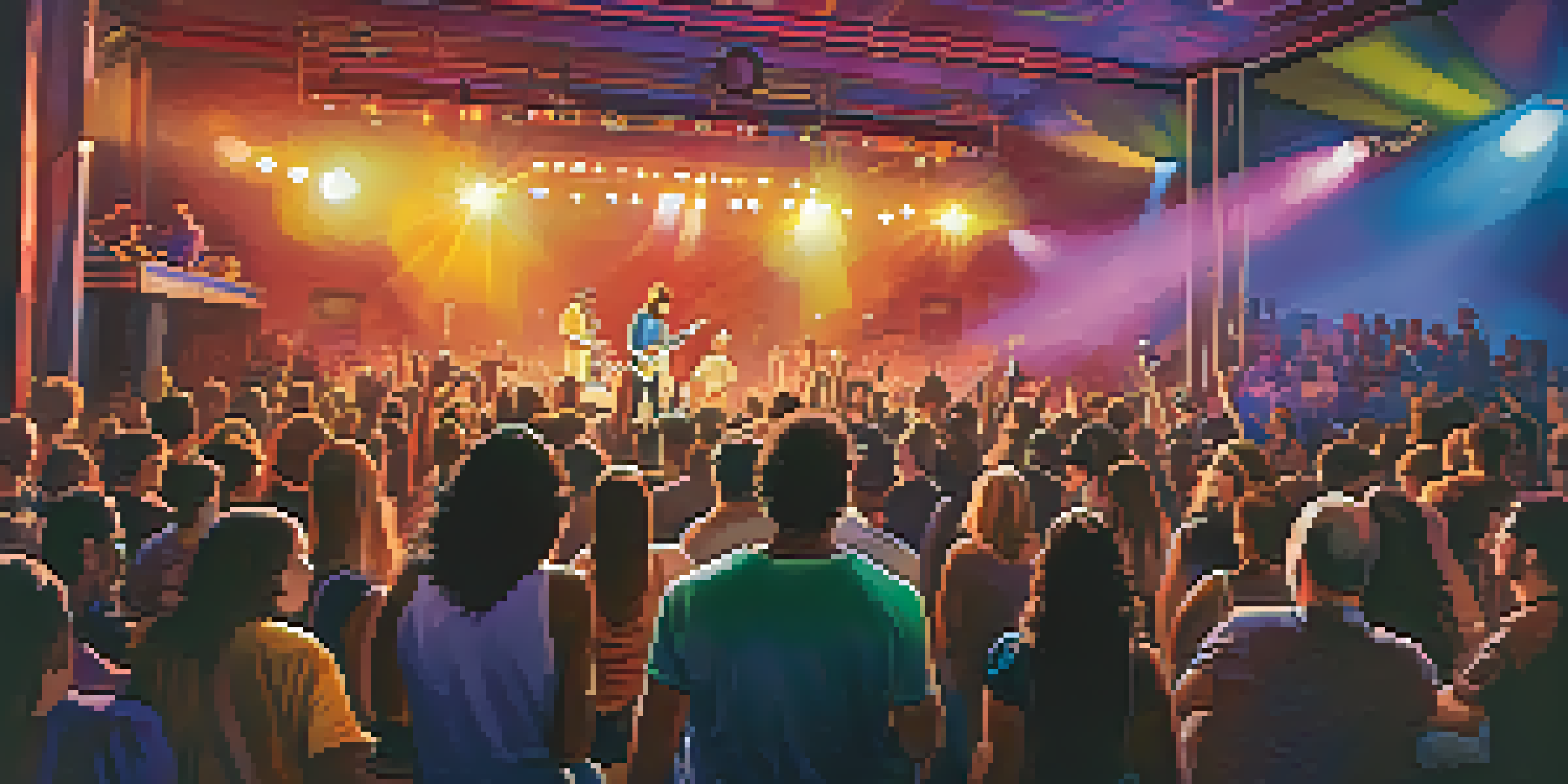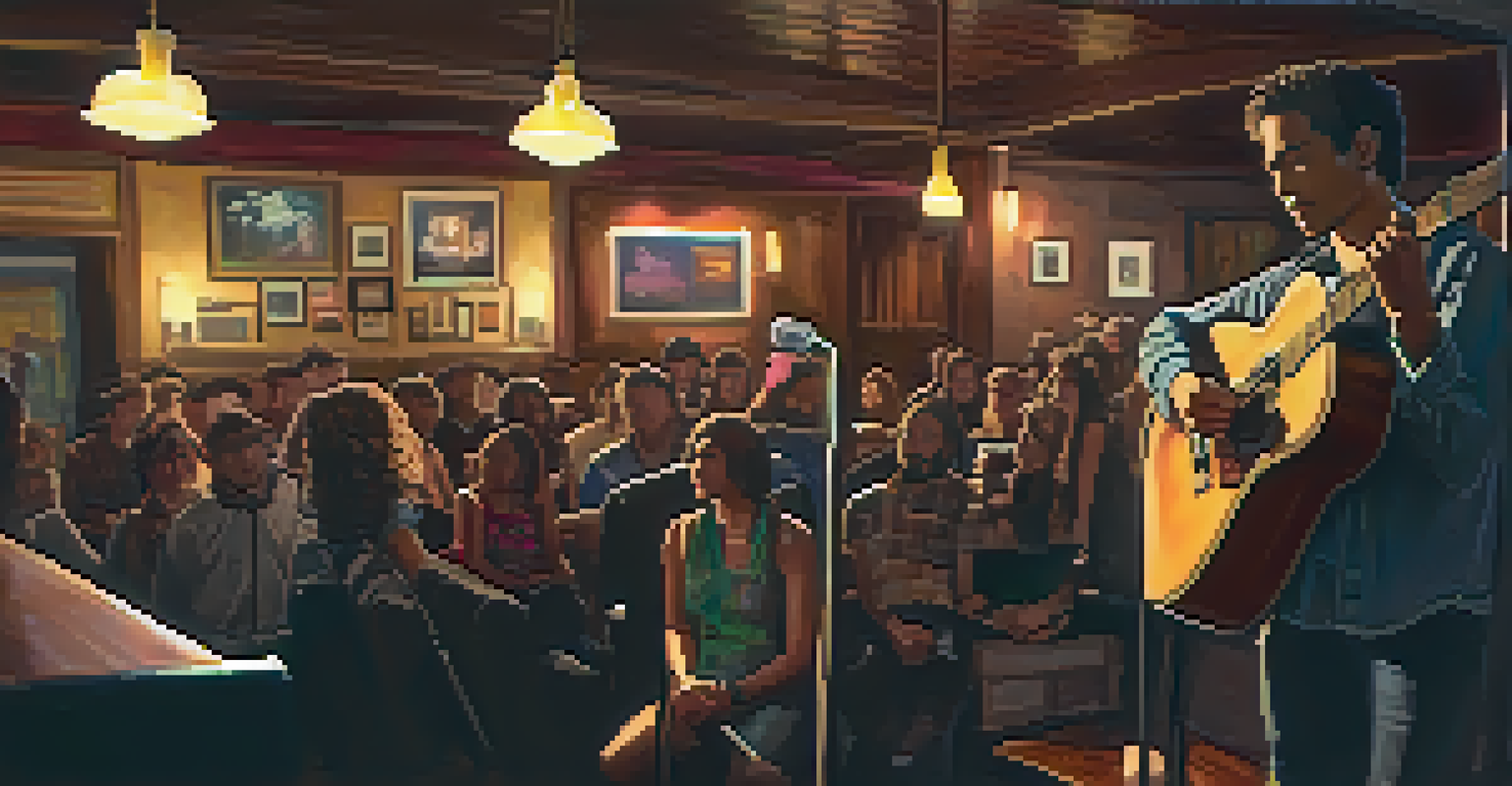Music Venues: The Pulse of Urban Community Interaction

The Role of Music Venues in Urban Culture
Music venues are more than just places to hear live music; they are cultural hubs that reflect the essence of urban life. They host a variety of events, from intimate acoustic sets to vibrant festivals, catering to diverse audiences. This variety not only showcases local talent but also creates a sense of belonging within the community.
Music can change the world because it can change people.
When you step into a music venue, you enter a space where creativity thrives and connections are made. Artists from different backgrounds come together, sharing their stories and experiences through their performances. This interaction fosters a rich tapestry of cultural exchange that is vital for any urban community.
Moreover, music venues often serve as a launchpad for emerging artists. They provide a platform for undiscovered talent, allowing local musicians to gain exposure and build their fan base. This symbiotic relationship between venues and artists strengthens the local music scene and enhances community pride.
Creating Community Connections Through Music
Music venues play a crucial role in bringing people together. Whether it's a weekend concert or an open mic night, these spaces encourage social interaction and foster friendships. Attendees often share a common interest in music, making it easier to strike up conversations and form connections.

For many, these venues become a second home—a place to unwind, enjoy live performances, and meet new people. This sense of belonging can be particularly important in urban environments, where the hustle and bustle can make individuals feel isolated. Music venues help bridge that gap, creating a warm, welcoming atmosphere.
Music Venues as Community Hubs
Music venues foster a sense of belonging and creativity, serving as cultural centers that connect diverse audiences.
Additionally, many venues collaborate with local organizations to promote community initiatives and causes. By hosting benefit concerts or themed events, they use music as a tool to address social issues and inspire change. This commitment to community engagement reinforces the idea that music is not just entertainment; it's a powerful catalyst for connection.
Economic Impact of Music Venues on Urban Areas
Beyond cultural significance, music venues significantly contribute to the local economy. They attract visitors, generate revenue, and create jobs, making them vital components of urban development. By drawing in crowds for concerts and events, these venues stimulate spending in surrounding businesses, including restaurants and shops.
The best part of being a musician is that you get to share your music with the world and bring people together.
Moreover, music festivals and large events hosted by these venues can put a city on the map, attracting tourists and boosting the local tourism industry. Cities known for their vibrant music scenes often see increased investment and interest from outside, which can lead to further economic growth.
However, it's essential to recognize the challenges many venues face, such as rising rents and competition from other entertainment options. Supporting local music venues is crucial for preserving the economic benefits they provide, as they play a pivotal role in sustaining the vibrant fabric of urban life.
The Evolution of Music Venues in the Digital Age
The rise of digital platforms has transformed how music is consumed, but music venues remain irreplaceable. Although streaming services allow for easy access to music, they cannot replicate the experience of live performances. Venues provide a unique atmosphere where fans can experience music in a communal setting, creating memories that last a lifetime.
In response to the digital age, many venues have adapted by incorporating technology into their offerings. Live-streaming events and engaging with audiences through social media are just a few ways venues have embraced change. This adaptability not only helps them reach a wider audience but also keeps the spirit of live music alive.
Economic Impact of Music Venues
These venues contribute significantly to local economies by attracting visitors, generating revenue, and creating jobs.
Furthermore, the digital age has allowed artists to build their brands more effectively, driving them to perform live more often. Venues benefit from this trend as emerging artists seek places to showcase their talent, creating a dynamic ecosystem that fuels both the local music scene and community interaction.
Inclusivity and Diversity in Music Venues
Inclusivity is a core value for many music venues, and they strive to create spaces where everyone feels welcome. A diverse lineup of artists reflects the community's makeup, allowing for a variety of musical styles and cultural expressions. This celebration of diversity fosters a sense of unity and understanding among attendees.
Moreover, venues often host events that highlight underrepresented voices in the music industry. By showcasing artists from various backgrounds, they challenge stereotypes and promote inclusivity. This commitment to diversity not only enriches the local music scene but also encourages community members to engage with different cultures.
Creating accessible environments is another essential aspect of inclusivity. Many venues are taking steps to ensure that everyone can enjoy live music, from wheelchair access to sensory-friendly events. This dedication to accessibility demonstrates that music truly is for everyone, and reinforces the idea that music venues are essential community spaces.
Music Venues as Safe Spaces for Expression
Music venues often serve as safe spaces where individuals can express themselves freely. These environments encourage creativity and authenticity, allowing artists and audiences to connect on a deeper level. In a world that can sometimes feel divisive, music venues provide a refuge where people can come together to celebrate their shared love of music.
For many, these venues become places to explore their identities and find community support. Open mic nights, for instance, empower individuals to share their stories and experiences, fostering acceptance and understanding. The shared vulnerability of live performance can create powerful connections among attendees.
Inclusivity in Music Spaces
Many music venues prioritize inclusivity, showcasing diverse artists and creating accessible environments for all.
Furthermore, venues often host events that address social justice issues, using music as a platform for advocacy. By amplifying marginalized voices and supporting important causes, music venues contribute to a culture of empathy and awareness, reinforcing their role as safe spaces for expression and community interaction.
The Future of Music Venues in Urban Communities
As urban landscapes continue to evolve, the future of music venues hangs in the balance. While challenges like gentrification and rising operational costs persist, there is also a growing recognition of their importance in fostering community. People are increasingly advocating for the preservation of these cultural spaces as vital components of urban identity.
Innovative concepts, such as hybrid venues that combine music with other forms of entertainment, are emerging to adapt to changing preferences. These venues not only offer live music experiences but also provide other activities, creating multifaceted spaces that attract diverse audiences. This evolution can help sustain the relevance of music venues in an ever-changing urban landscape.

Ultimately, the future of music venues will depend on community support and engagement. By attending shows, advocating for local artists, and participating in community initiatives, individuals can help ensure that these spaces remain vibrant and essential to urban life. The pulse of urban community interaction relies on the heartbeat of music venues!